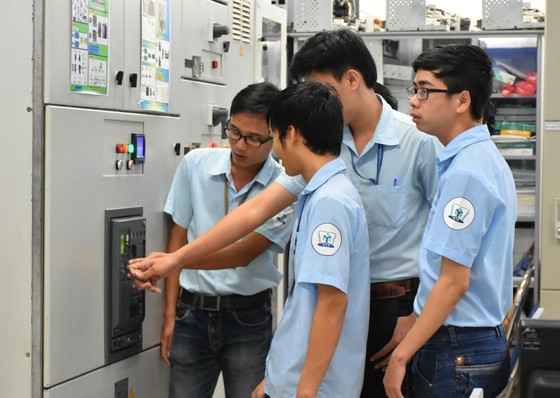
These public universities collect half training fee from schoolers and the remaining is taken from their management bodies’ budget according to the decree 86. With such low finance, schools find it hard to guarantee its training quality.
As per the decree 86, a student of social science majors, economic, law, agriculture-forestry-fishery pays tuition fee of VND9.8 million (US$ 421.6) a year while their peers in majors of natural science, technology, technique, sports, art and hospitality are charged VND 11.7 million a year; major of medicine and pharmacy VND14.3 million a year.
Those who pursue master degree pay 1.5 times higher than that paid by graduates and postgraduates pay 2.5 times higher than that paid by graduates. Notwithstanding fees paid by schoolers, the government granted the rest to schools annually.
President of the Ho Chi Minh City Medicine University Dr. Tran Diep Tuan said that a student paid VND13 million for all majors in the school last year. Annually, the Ministry of Education and Training provided VND130 billion to the school to compensate the shortage of training fee.
Presently, more than 9,000 students are learning at the school. For a detailed calculation, the granted amount is just enough for paying lecturers’ salary, Mr. Tuan said.
He added that the school has not cooperated with any schools in training to earn more money; accordingly, the government should pay more to cover all or the school should be self-financing institution.
Following the statement of President of Medicine School, Vice President of the Nong Lam University Associate Professor Huynh Thanh Hung, said that the school admits 20,000 students excluding those pursuing master degree and postgraduates. The Ministry just grants a sum to cover 30 percent of lecturers’ salary and the rest is covered by students’ tuition payment.
However, if the school hikes tuition fee, many students will drop out of school as at the annual program to dialog with students, when school managers mention increase in tuition fees, they have a lot of sympathy for students’ feedbacks. In fact, students can’t afford a real fee to ensure training quality; therefore, it is hard to hike tuition fee for public school with many majors like Nong Lam University, said Mr. Hung.
Worse, pedagogy schools are always waiting for grants of the government because students don’t pay for tuition fee. Principal of the Ho Chi Minh City Pedagogy University Dr. Nguyen Minh Hong said that around 12,000 students are studying at the school with half of them pursuing teach training. The government’s grants can cover half expenditure.
The school prioritize to pay salary and bonus for lecturers and students’ scholarships; therefore, it takes heed of money saving while makes use of collection of services and contributions to supplement its funding sources for regular activities and scientific researches, international cooperation.
Based on the decree 77, 23 public universities have become self-financing ones collecting higher tuition fee but can’t exceed the framework regulated by the decree 86.
A student majoring in social science, economic, law, agriculture-fishery-fishery in a self-financing university pays VND20.5 million per year while their peers majoring in natural science, technology, sport, art, hospitality and tourism pay VND24 million per year and those in medicine schools pay VND50.5 million yearly.
Principal of the HCMC University of Technology and Education Associate Professor Do Van Dung revealed that the school has been self-financing for three years and it has not received money from the Ministry of Education and Training any more. Therefore, the school has calculated training fee strictly to have a suitable tuition fee level; for instance, students of some major pay less than VND20 million tuition fee lower than the level regulated by the decree 86.
Nevertheless, he said, to ensure training quality, tuition charges of technology majors must be VND50 million. Yet, if the school collects high tuition fee, no student will enroll in the major.
In reality, the University of Science and technology in the Central City of Da Nang had no student because the school collected high tuition charges. Finally, the school had to admit students with low qualifying scores which badly affected training quality.
Managers of other self-financing universities such as Economy University, Finance-Marketing University, the Industry University in HCMC all said that collection of tuition fee is a really difficult problem.
In comparison with other schools in the world, there is a big gap. A Vietnamese student pays VND16.2 million averagely according to the Ministry of Education and Training’s statistics in 2017 while their peers in the South Korea, Japan, Singapore, and Thailand pay from tens to hundreds of million dong a year.
























